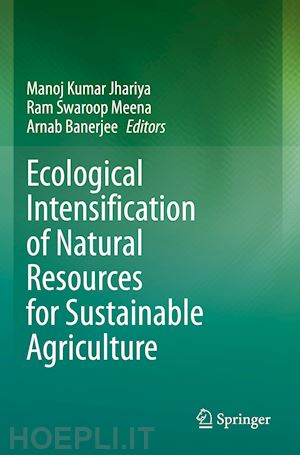
Questo prodotto usufruisce delle SPEDIZIONI GRATIS
selezionando l'opzione Corriere Veloce in fase di ordine.
Pagabile anche con Carta della cultura giovani e del merito, 18App Bonus Cultura e Carta del Docente
Ecological intensification involves using natural resources such as land, water, soil nutrients, and other biotic and abiotic variables in a sustainable way to achieve high performance and efficiency in agricultural yield with minimal damage to the agroecosystems. With increasing food demand there is high pressure on agricultural systems. The concept of ecological intensification presents the mechanisms of ensuring high agricultural productivity by restoration the soil health and landscape ecosystem services. The approach involves the replacement of anthropogenic inputs with eco-friendly and sustainable alternates. Effective ecological intensification requires an understanding of ecosystems services, ecosystem's components, and flow of resources in the agroecosystems. Also, awareness of land use patterns, socio-economic factors, and needs of the farmer community plays a crucial role. It is therefore essential to understand the interaction of ecosystem constituents within the extensive agricultural landscape. The editors critically examined the status of ecological stress in agroecosystems and address the issue of ecological intensification for natural resources management. Drawing upon research and examples from around the world, the book is offering an up-to-date account, and insight into the approaches that can be put in practice for poly-cropping systems and landscape-scale management to increase the stability of agricultural production systems to achieve ‘Ecological resilience’. It further discusses the role of farmer communities and the importance of their awareness about the issues. This book will be of interest to teachers, researchers, climate change scientists, capacity builders, and policymakers. Also, the book serves as additional reading material for undergraduate and graduate students of agriculture, forestry, ecology, agronomy, soil science, and environmental sciences. National and international agricultural scientists, policymakers will also find this to be a useful read for green future.
Dr. Manoj Kumar Jhariya is Assistant Professor at the Department of Farm Forestry, Sant Gahira Guru Vishwavidyalaya (Formerly Sarguja University) Ambikapur (Chhattisgarh), India, and the author or co-author of more than 68 scientific papers, 09 books, 33 book chapters and several extension articles. Dr.Jhariya acquired B.Sc. (Agriculture), M.Sc. and Ph.D. (both in Forestry) degrees from Indira Gandhi Krishi Vishwavidyalaya, Raipur, Chhattisgarh, India. Dr.Jhariya was awarded a UGC-RGNF Fellowship, New Delhi, India, and received a Chhattisgarh Young Scientist Award from Chhattisgarh Council of Science and Technology in 2013. He is an editorial board member for several journals and a life member of numerous societies
Dr. Ram Swaroop Meena is working as an Assistant Professor in the Department of Agronomy, I.Ag. Scs., BHU, Varanasi (UP). Dr. Meena has been awarded Raman Research Fellowship by the MHRD, GOI. He has completed his postdoctoral research on soil carbon sequestration under Prof. Rattan Lal World Food Prize 2020 Laureate 2020, Director, CMASC, Columbus, USA. Dr. Meena has supervised 20 PG and 6 PhD students, and have10 years of research and teaching experience. He is working on the three externally funded projects (DST, MHRD, ICAR) with one patent. Dr. Meena has published more than 110 research and review papers and have H-index ~ 40, as well 4 published books at the national and 14 books at the international levels, and contributedin the books with 15 chapters at national and 50 at the international levels. He has worked as an expert for the NCERT, MHRD, GOI. Dr. Meena is contributed in several agricultural extension activities, trainings, meetings, workshops, etc.
Dr. Arnab Banerjee is an assistant professor, Department of Environmental Science, Sant Gahira Guru Vishwavidyalaya, Ambikapur, Chhattisgarh, India. He has completed M.Sc. and Ph.D. (Environmental Science) from Burdwan University and M.Phil. in Environmental Science from Kalyani University, West Bengal. He won the University Gold Medal for securing first class first position in M.Sc. examination. He has been awarded Young Scientist Award for best oral presentation at the international conference held at the University of Burdwan. He was a project fellow under UGC-sponsored major research project. To his credit, he has published 67 research papers in reputed national and international journals, 8 books, and 27 book chapters. He is life member of the Academy of Environmental Biology. He has supervised 23 postgraduate students and engaged in Postgraduate Teaching and Research.
,











Il sito utilizza cookie ed altri strumenti di tracciamento che raccolgono informazioni dal dispositivo dell’utente. Oltre ai cookie tecnici ed analitici aggregati, strettamente necessari per il funzionamento di questo sito web, previo consenso dell’utente possono essere installati cookie di profilazione e marketing e cookie dei social media. Cliccando su “Accetto tutti i cookie” saranno attivate tutte le categorie di cookie. Per accettare solo deterninate categorie di cookie, cliccare invece su “Impostazioni cookie”. Chiudendo il banner o continuando a navigare saranno installati solo cookie tecnici. Per maggiori dettagli, consultare la Cookie Policy.